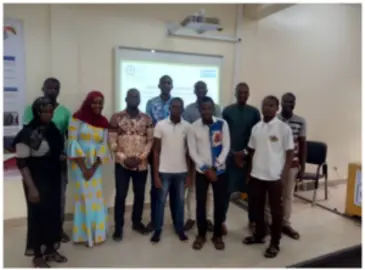WAC-SRT students’ Climate and Sustainable Development Action Club kicks-off youth-empowering capacity building
December 09, 2020.
The Youth Challenge Fund of Plan International West and Central Africa launched a call in May 2020 for creative, innovative, and local projects with a link to one of the challenges posed by COVID-19 in the region. The Youth Challenge Fund is a competition aimed at supporting young committed leaders between 10 and 23 years old in the 14 West and Central African countries in which Plan International is operating.
Among the 25 award-winning initiatives (out of 1,300 applications) was an innovative capacity building project on “Entrepreneurship and Empowerment of Nigerien Youth in the face of Covid-19”. It was submitted by a group of highly committed and motivated students from the ZEF-led WAC-SRT program (West African Center for Sustainable Rural Transformation, see https://www.zef.de/project/wac-srt), in particular the members of its Climate and Sustainable Development Actions Club (CSDAC).
The Climate and Sustainable Development Actions Club (CSDAC) was founded in 2018 by 10 WAC-SRT master students and consists of 50 active members now. It is a regional network of young professionals and students who are contributing to the climate change discourse and offering solutions at all levels. Strong commitment to enhancing local communities’ practices towards the SDGs and African Union Agenda 2063 –especially in regard to environmental protection, gender equality and climate change resilience, adaptation and mitigation– have been at the core of the activities of CSDAC.
CSDAC has also engaged in social media activities as part of awareness-raising campaigns before and especially after the outbreak of the COVID-19 pandemic. In addition, they started information campaigns about preventive measures with regard to COVID-19 (awareness raising about hygiene and social distancing in social media (mainly facebook), distribution of masks and hand sanitizers). Going beyond their climate change-related mandate, CSDAC students’ actions during the pandemic show how dedicated they are to improve the livelihoods in their communities and increase the impact of their research and university in their own environment.
If you want to learn more about these students’ inspiring actions, have a look at the interview! It is also worth checking out their work in their Facebook and YouTube channels.
These are the students who worked together on the winning proposal:
Sakina Abawaa,
Obdou Délano Thierry (see https://www.linkedin.com/in/thierry-odou/)
Segbedji Geraldo Favi (read the interview below) (see https://www.linkedin.com/in/segbedji-geraldo-favi/)
Amal Salla Mayaki
Armel Lemonla Otekpo
--------------------------------------
Interview with Segbedji Geraldo Favi, Master student from WAC-SRT at University Abdou Moumouni, Niamey, Niger, who was one of the driving forces behind the application.
How did you learn about the Plan International call, and what has driven you and your colleagues of CSDA you to submit a proposal?
We heard about the call that Plan International West and Central Africa launched in May 2020 for creative, innovative, and local projects with a link to one of the challenges posed by COVID-19. The call for applications was published on several social media, especially on Facebook, where the information was seen by Armel Otekpo (Fund raiser). More than 1,300 entries were submitted for the first edition of the Youth Challenge Fund, but only 25 were selected including our proposal in the category “Youth empowerment and entrepreneurship”. Applying for the Youth Challenge Fund requires a commitment to act, learn, inspire and share with youth and communities in the region. It is this commitment that was our motivation to apply for these funds.
What exactly is your proposal, what do you envisage with this project?
The project is entitled: Entrepreneurship and Empowerment of Nigerian Youth in the face of Covid-19. It was inspired by two significant developments that young people in our surroundings have been confronted with:
• High unemployment rate, especially among women;
• Exacerbation of economic vulnerability among the majority of the population, most of them young people, as a result from the outbreak of COVID-19 and related restriction measures. Many people in the region are living from daily work and income.
So, our project, to be operated in Niger, aims to strengthen the capacities of young people and empower them, especially girls. We do so by training them how to install and deploy solar systems for irrigation. This allows them to be operational on the job market.
And how does your proposal build on what you and your colleagues have been learning and discussing in the context of the WAC-SRT master program?
Given the interdisciplinary nature of the WAC-SRT Program, we received various courses on solar energy, irrigation and the nexus between water, energy and food. This education has provided us with the scientific knowledge and expertise which enabled us to apply. On the other hand we are part of the local communities and therefore aware of the challenges they are facing, and what solutions are out there to be implemented in a sustainable manner. Based on that we have proposed this Youth Capacity-building project to be able to address a gap in our society, especially in Niger, and share with our peers the knowledge we got from our education as WAC-SRT master students. Moreover, the tips we learned at a Workshop on Proposal and Research writing organized by the WAC-SRT program during our master training really helped us a lot to write a winning proposal.
When have you prepared your application? How has the pandemic affected your work, how have you managed to discuss, meet, and how did it affect the format/idea of your proposal?
This project was written during the COVID-19 period, and the main challenge was to organize meetings among members, since restrictions were imposed on public gatherings. However, thanks to technology, we were able to organize regular online meetings using Zoom or Google Meet, and we were keeping in touch through a WhatsApp group specifically created for this project. We met online daily at 11:30 PM, until our envisioned objective was achieved.
How many people will join your capacity building project? How many applications did you receive and how was the selection process?
We had planned to select 30 youths aged from 18 to 24 years old from Niger, with the target of 20 female and 10 male candidates. The call for applications was accessible to potential candidates from September 15 to 02 October 02, 2020. In order to encourage candidates and give more details, we also prodcuded and posted a video. We received a total of 167 applications from six countries (Niger, Benin, Togo, Burkina-Faso, Cameroon and Chad), among them 135 male and 32 female candidates. After the work of the selection committee on October 22, 2020, we selected 30 candidates living in Niger’s capital Niamey to take part in the training. CSDAC members from the first and second batch of the WAC-SRT program have participated in the selection.
What do you want to achieve through this capacity-building project?
With this project, our goal is to create a new generation of proactive technicians with an entrepreneurial spirit. Thus, we cannot not only reduce the unemployment rate of young people but also provide technical support to the population who is in need of integrated solutions for water, energy and agriculture. At the end of the capacity-building project, our trainees will receive a set of technical tools such as digital electrical meters, screwdrivers, etc. that will allow them to start to implement what they have learned.
What would you tell other students in Tamale and Wa (both in Ghana), in Niamey or in other DAAD African Excellence Centers based on your experience?
What we can tell and share with our colleagues is that we must always think about the impact we have on our environment and how to give back to the community. It is the only way for us to be part of the change we want in our community and the continent as a whole. The main driver for our project was the sense of responsibility we felt vis-à-vis the youth and the situation they were in. Especially during the early phase of the pandemic, when different restriction measures were put in place, youth was prevented from going to work, though they are mainly living from their daily, mostly informal business.
We would like to invite our colleagues to believe in themselves. Putting together their effort and expertise, they can achieve more than they might think. They should also persevere and be ready for the sacrifice; in other words, nothing comes easy. This is not the only project we submitted in that time. We have applied to three other funding challenges dedicated to COVID-19 during that period, and we did not always succeed, but we kept trying and pushing. It happened that we worked throughout the night till the morning without noticing, because what we wanted was to achieve our goal.
We thank the CSDAC team and our soon-to-be graduated master student Segbedji Geraldo Favi for their encouraging example and for taking the time for this interview!
The interview was conducted by Aline Pereira.



